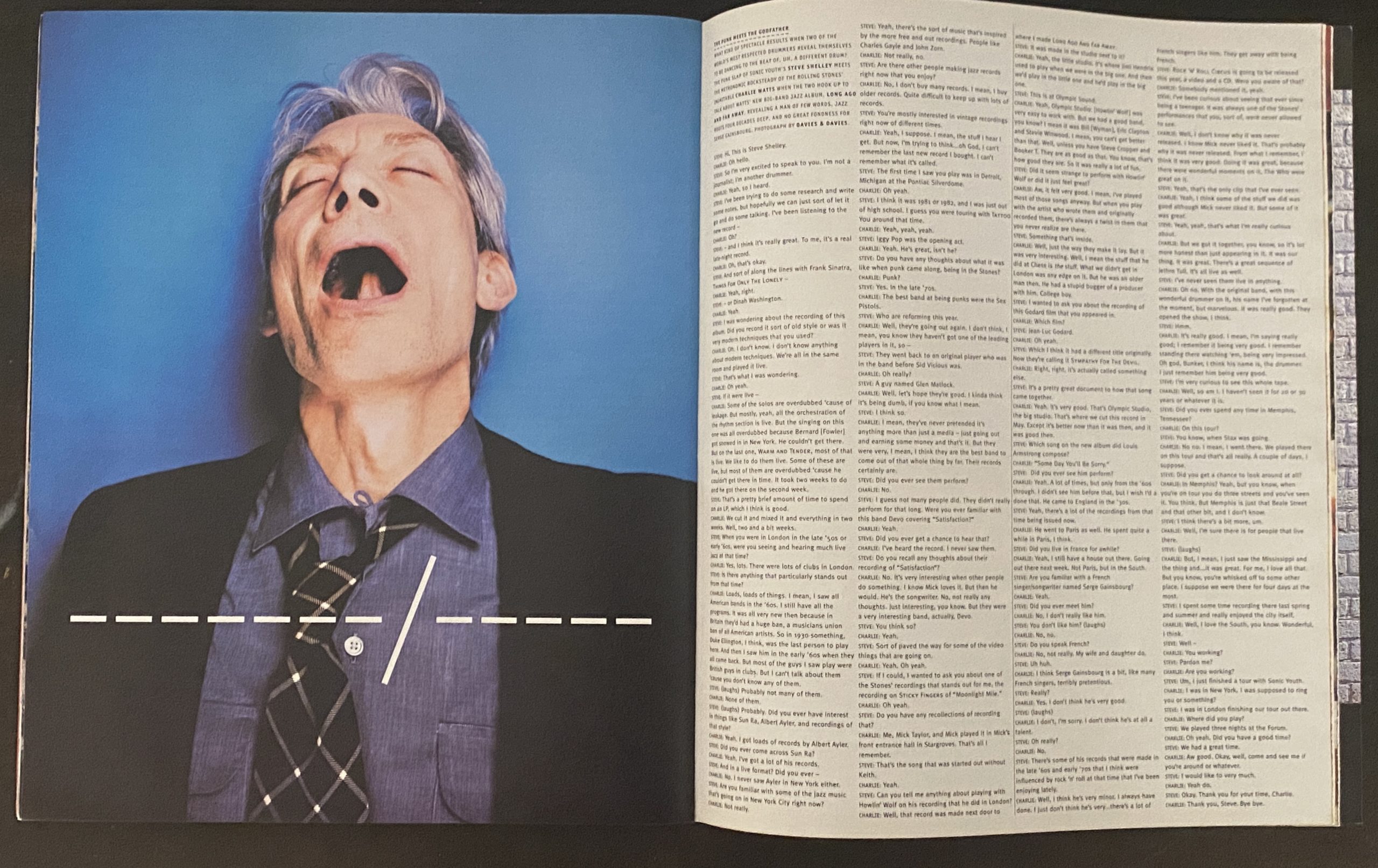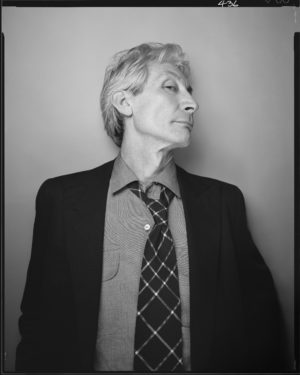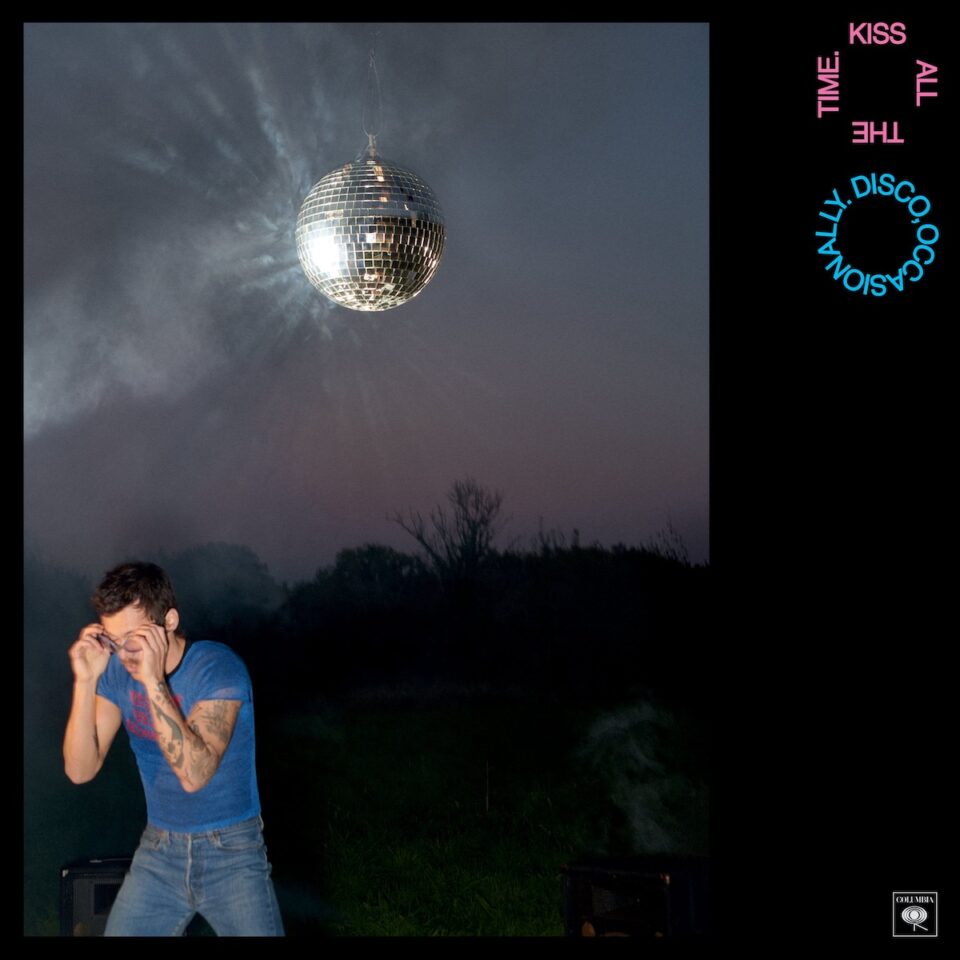As remembrances poured in this week on the passing of the great Charlie Watts, I thought back to this conversation I set up in 1996 when I was editor of RayGun Magazine. We were offered the opportunity to interview Watts in advance of his jazz album, Long Ago and Far Away, and wanted do something special, so I reached out to Sonic Youth‘s Steve Shelley. He jumped at the chance to interview one of his heroes, and we were thrilled to feature an interview with the coolest drummer of all time by the drummer of one of the greatest and most influential bands of the alternative era. I reconnected with Shelley this week, who recalled “the interview didn’t quite go as planned. Charlie clammed up during the interview, but I’ll never forget it.” Although he was a man of few words, the interview is more insightful than he remembers, with Watts speaking candidly on everything from his love of jazz to his fondness for the Sex Pistols to his outright disdain for Serge Gainsbourg. (Shelley is hosting a special edition of his “Aspirin-Mint” radio show with Paulo Kishimoto dedicated to Watts on August 27 at 9:30 a.m. PST.)
While the conversation with Watts and Shelley took place over the phone, we were also able to schedule a photo session in London with Watts and frequent RayGun photographer Ian Davies, who found Watts to be incredibly polite and gracious. “Being a member of the most famous band in the history of rock ‘n’ roll should give you a few ego eccentricities—or so I thought,” Davies reflected this week. “Charlie Watts is almost so down to earth and polite that you start to think that (he feels) it’s more an honor for him to meet you. I turned up at the location, The Halcyon Hotel, and waited in a side room while Charlie was finishing being interviewed. I had brought a mini studio of equipment with me: lights, large format 10×8 camera, backdrops—the lot, as I was thinking to try and set up like I would had we shot in a studio location. Charlie opened up the main hotel suite doors and took one look, smiled, and asked me which camera box he should help bring into the room for me. So my first contact with Charlie was how can Charlie Watts, the legend, help me?!” (Check out more of Ian Davies’ work here.)
Published for the first time online—with Shelley and Davies’ blessing—here’s the entire interview from RayGun’s pages in 1996. — Randy Bookasta
Steve Shelley: Hi. This is Steve Shelley.
Charlie Watts: Oh hello.
Steve. So I’m very excited to speak to you. I’m not a journalist; I’m another drummer.
Charlie: Yeah, so I heard.
Steve: I’ve been trying to do some research and write some notes, but hopefully we can just sort of let it go and do some talking. I’ve been listening to the new record—
Charlie: Oh?
Steve: —and I think it’s really great. To me, it’s a real late night record.
Charlie: Oh, that’s okay.
Steve: And sort of along the lines with Frank Sinatra, Sings for Only The Lonely—
Charlie: Yeah, right.
Steve: —or Dinah Washington.
Charlie: Yeah.
Steve: I was wondering about the recording of this album. Did you record it sort of old style or was it very modern techniques that you used?
Charlie: Oh. I don’t know. I don’t know anything about modern techniques. We’re all in the same room and played it live.
Steve: That’s what I was wondering.
Charlie: Oh yeah.
Steve: If it were live —
Charlie: Some of the solos are overdubbed ‘cause of leakage. But mostly, yeah, all the orchestration of the rhythm section is live. But the singing on this one was all overdubbed because Bernard [Fowler] got snowed in in New York. He couldn’t get there. But on the last one, Warm and Tender, most of that is live. We like to do them live. Some of these are live, but most of them are overdubbed ‘cause he couldn’t get there in time. It took two weeks to do and he got there on the second week.
Steve: That’s a pretty brief amount of time to spend on an LP, which I think is good.
Charlie: We cut it and mixed it and everything in two week. Well, two and a bit weeks.
Steve: When you were in London in the late ‘50s or early ‘60s, were you seeing and hearing much live jazz at that time?
Charlie Yes, lots. There were lots of clubs in London.
Steve: Is there anything that particularly stands out from that time?
Charlie: Loads, loads of things. I mean, I saw all American bands in the ‘60s. I still have all the programs. It was all very new then because in Britain they’d had a huge ban, a musicians union ban of all American artists. So in 1930-something, Duke Ellington, I think, was the last person to play here. And then I saw him in the early ‘60s when they all came back. But most of the guys I saw play were British guys in clubs. But I can’t talk about them ‘cause you don’t know any of them.
Steve: (laughs) Probably not many of them.
Charlie: None of them.
Steve: (laughs) Probably. Did you ever have interest in things like Sun Ra, Albert Ayler, and recordings of that style?
Charlie: Yeah. I got loads of his records.
Steve: And in a live format? Did you ever—
Charlie: No, I never saw Ayler in New York either.
Steve: Are you familiar with some of the jazz music that’s going on in New York City right now?
Charlie: Not really.
Steve: Yeah, there’s sort of music that’s inspired by more free and out recordings. People like Charles Gayle and John Zorn.
Charlie: Not really, no.
Steve: Are there other people making jazz records right now that you enjoy?
Charlie: No, I don’t buy many records. I mean, I buy older records. Quite difficult to keep up with lots of records.
Steve: You’re mostly interested in vintage recordings right now of different times.
Charlie: Yeah, I suppose. I man, the stuff I hear I get. But now, I’m trying to think… oh God, I can’t remember the last new record I bought. I can’t remember what it’s called.
Steve: The first time I saw you play was in Detroit, Michigan at the Pontiac Silverdome.
Charlie: Oh yeah.
Steve: I think it was 1981 or 1982, and I was just out of high school. I guess you were touring with Tattoo You around that time.
Charlie: Yeah, yeah, yeah.
Steve: Iggy Pop was the opening act.
Charlie: Yeah. He’s great, isn’t he?
Steve: Do you have any thoughts about what it was like when punk came along, being in the stones?
Charlie: Punk?
Steve: Yes, in the late ‘70s.
Charlie: The best band at being punks were the Sex Pistols.
Steve: Who are reforming this year.
Charlie: Well, they’re going out again. I don’t think, I mean, you know they haven’t got one of the leading players in it, so—
Steve: They went back to an original player who was in the band before Sid Vicious was.
Charlie: Oh really?
Steve: A guy named Glen Matlock.
Charlie: Well, let’s hope they’re good. I kinda think it’s being dumb, if you know what I mean.
Steve: I think so.
Charlie: I mean, they’ve never pretended it’s anything more than just a media—just going out and earning some money and that’s it. But they were very, I mean, I think they are the best band to come out of that whole thing by far. Their records certainly are.
Steve: Did you ever see them perform?
Charlie: No.
Steve: I guess not many people did. They didn’t really perform for that long. Were you familiar with Devo covering “Satisfaction?”
Charlie: Yeah.
Steve: Did you ever get a chance to hear that?
Charlie: I’ve heard the record. I never saw them.
“The best band at being punks were the Sex Pistols. I think they are the best band to come out of that whole thing by far. Their records certainly are.”
Steve: Do you recall any thoughts about their recording of “Satisfaction”?
Charlie: No. It’s very interesting when other people do something. I know Mick loves it. But then he would. He’s the songwriter. No, not really any thoughts. Just interesting you know. But they were a very interesting band, actually, Devo.
Steve: You think so?
Charlie: Yeah.
Steve: Sort of paved the way for some of the video things that are going on.
Charlie: Yeah. Oh yeah.
Steve: If I could, I wanted to ask you about one of the Stones’ recordings that stands out for me, the recording on Sticky Fingers of “Moonlight Mile.”
Charlie: Oh yeah.
Steve: Do you have any recollections of recording that?
Charlie: Me, Mick Taylor, and Mick played it in Mick’s front entrance hall in Stargroves. That’s all I remember.
Steve: That’s the song that was started out without Keith.
Charlie: Yeah.
Steve: Can you tell me anything about playing with Howlin’ Wolf on his recording that he did in London.
Charlie: Well, that record was made next door to where I made Long Ago and Far Away.
Steve: It was made in the studio next to it?
Charlie: Yeah, the little studio. It’s where Jimi Hendrix used to play when we were in the big one. And then we’d play in the little one and he’d play in the big one.
Steve: This is at Olympic Sound.
Charlie: Yeah, Olympic Studio. [Howlin’ Wolf] was very easy to work with. But we had a good band, you know? I mean it was Bill [Wyman], Eric Clapton and Stevie Winwood. I mean, you can’t get better than that. Well, unless you have Steve Cropper and Booker T. They are as good as that. You know, that’s how good they are. So it was really a lot of fun.
Steve: Did it seem strange to perform with Howlin’ Wolf or did it just feel great?
Charlie: Aw, it felt very good. I mean, I’ve played most of those songs anyway. But when you play with the artist who wrote them and originally recorded them, there’s always a twist in them that you never realize are there.
Steve: Something that’s inside.
Charlie: Well, just the way they make it lay. But it was very interesting. Well, I mean the stuff that he did at Chess is the stuff. What we didn’t get in London was any edge on it. But he was an older man then. He had a stupid bugger of a producer with him. College boy.
Steve: I wanted to ask you about the recording of this Godard film that you appeared in.
Charlie: Which film?
Steve: Jean-Luc Godard.
Charlie: Oh yeah.
Steve: Which I think it had a different title originally. Now they’re calling it Sympathy For The Devil.
Charlie: Right, right, it’s actually called something else.
Steve: It’s pretty great to document how that song came together.
Charlie: Yeah. It’s very good. That’s Olympic Studio, the big studio. That’s where we cut this record in May. Except it’s better now than it was then, and it was good then.

Original RayGun Magazine feature from September 1996. Design by Robert Hales. Photo by Ian Davies.
Steve: Which song on the new album did Louis Armstrong compose?
Charlie: “Some Day You’ll Be Sorry.”
Steve. Did you ever see him perform?
Charlie: Yeah. A lot of times, but only from the ‘60s through. I didn’t see him before that, but I wish I’d done that. He came to England in the ‘30s.
Steve. Yeah, there’s a lot of the recordings from that time being issued now.
Charlie: He went to Paris as well. He spent quite a while in Paris, I think.
Steve: Did you live in France for awhile?
Charlie: Yeah, I still have a house out there. Going out there next week. Not Paris, but in the South.
Steve: Are you familiar with a French singer/songwriter named Serge Gainsbourg?
Charlie: Yeah.
Steve: Did you ever meet him?
“I don’t really like him. I think Serge Gainsbourg is a bit, like many French singers, terribly pretentious. I don’t think he’s at all a talent.”
Charlie: No. I don’t really like him.
Steve: You don’t like him? (laughs)
Charlie. No, no.
Steve: Do you speak French?
Charlie: No, not really. My wife and daughter do. I think Serge Gainsbourg is a bit, like many French singers, terribly pretentious.
Steve: Really?
Charlie: Yes, I don’t think he’s very good.
Steve: (laughs)
Charlie: I don’t, I’m sorry. I don’t think he’s at all a talent.
Steve: Oh really?
Charlie: No.
Steve: There’s some of his records that were made in the late ‘60s and early ‘70s that I think were influenced by rock ‘n’ roll at that time that I’ve been enjoying lately.
Charlie: Well, I think he’s very minor. I always have done. I just don’t think he’s very… there’s a lot of French singers like him. They get away with being French.
Steve: Rock ‘n’ Roll Circus is going to be released this year, a video and a CD. Were you aware of that?
Charlie: Somebody mentioned it, yeah.
Steve: I’ve been curious about seeing that ever since being a teenager. It was always one of the Stones’ performances that you, sort of, were never allowed to see.
Charlie: Well, I don’t know why it was never released. I know Mick never liked it. That’s probably why it was never released. From what I remember, I think it was very good. Doing it was great, because there were wonderful moments on it. The Who were great on it.
Steve: Yeah, that’s the only clip that I’ve ever seen.
Charlie: Yeah, I think some of the stuff we did was good although Mick never liked it. But some of it was great.
Steve: Yeah, yeah, that’s what I’m really curious about.
Charlie: But we got it together, you know, so it’s lot more honest than just appearing in it. It was our thing. It was great. There’s a great sequence of Jethro Tull. It’s all live as well.
Steve: I’ve never seen them live in anything.
Charlie: Oh no. With the original band, with this wonderful drummer on it, his name I’ve forgotten at the moment, but marvelous. It was really good. They opened the show, I think. It’s really good. I mean, I’m saying really good; I remember it being very good. I remember standing there watching ‘em, being very impressed. Oh god, Bunker, I think his name is, the drummer. I just remember him being very good.
Steve: I’m very curious to see this whole tape.
Charlie: Well, so am I. I haven’t seen it for 20 or 30 years or whatever it is
Steve: Did you ever spend any time in Memphis, Tennessee?
Charlie: On this tour?
Steve: You know, when Stax was going.
Charlie. No, no. I mean, I went there. We played there on this tour and that’s all really. A couple of days, I suppose.
Steve: Did you get a chance to look around at all?
Charlie: In Memphis? Yeah, but you know, when you’re on tour you do three streets and you’ve seen it. You think. But Memphis is just that Beale Street and that other bit, and I don’t know.
Steve: I think there’s a bit more, um.
Charlie: Well, I’m sure there is for people that live there.
Steve: (laughs)
View this post on Instagram
Charlie: But, I mean, I just saw the Mississippi and the thing and… it was great. For me, I love all that. But you know, you’re whisked off to some other place. I suppose we were there for four days at the most.
Steve: I spent some time recording there last spring and summer and really enjoyed the city itself.
Charlie: Well, I love the South, you know. Wonderful, I think.
Steve: Well —
Charlie: You working?
Steve: Pardon me?
Charlie: Are you working?
Steve: I just finished a tour with Sonic Youth.
Charlie: I was in New York. I was supposed to ring you or something?
Steve: I was in London finishing our tour out there.
Charlie: Where did you play?
Steve: We played three nights at the Forum.
Charlie: Oh yeah. Did you have a good time?
Steve: We had a great time.
Charlie: Aw good. Okay, well, come and see me if you’re around or whatever.
Steve: I would like to very much.
Charlie: Yeah do.
Steve: Okay. Thank you for your time, Charlie.
Charlie. Thank you, Steve. Bye bye.








